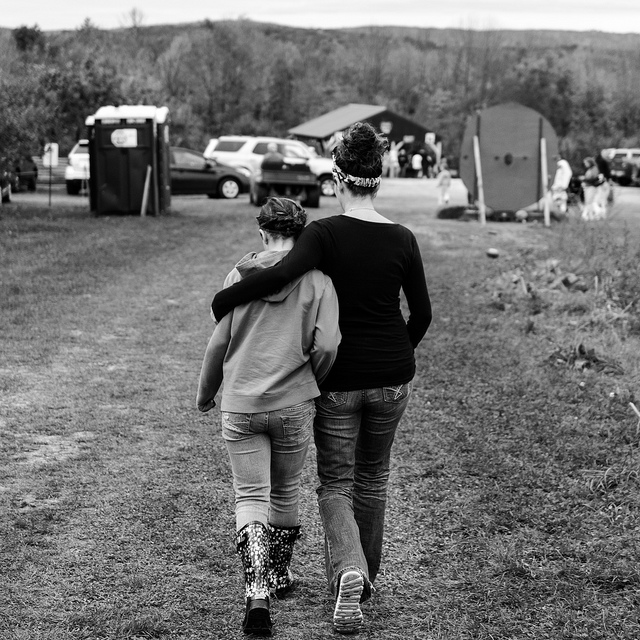When I was 10 years old, I was smacked in the face with death.
My mother committed suicide. At the time, I didn’t really understand what happened.
Truthfully, I went into shock.
I remember on the day it happened, I made up a fantasy that my mom had gone on a vacation to Hawaii. I thought eventually she would come home, but after a couple days, I realized that wasn’t the case.
Her death took me through a whirlwind journey, teaching me lessons about myself and life that I couldn’t have learned under any other circumstances. Through her decision, I have developed a new lens through which I see the world, one that is different than most people.
1. Being strong can help you heal:
Although I was forced into an extremely difficult situation, I did my best to be strong. I was compelled to do everything I could to protect my younger brother, to keep him safe from the ideas and thoughts that were floating around in my head. I had no idea what I was doing, but I did my best to do something. I didn’t want him to feel abandoned, hurt and lonely as I did.
We became close, best friends even. My mom’s death should have driven us apart, torn us apart as siblings; instead, we grew closer and developed a close relationship that is enviable to most people. I hoped that through my actions, my brother wouldn’t feel the burden of losing his mom. I wanted to be a good role model for him growing up, and so I worked toward this. I excelled in school; I worked hard to make him proud. I did everything I could to be a good example for him.
I hoped that would be enough, and for the most part, it was.
If I didn’t take the steps I did to be a good older sister, I’m not sure what would have happened to my brother and I. Providing strength for him, and being a role model for him allowed me to get out of my own head and focus on helping someone else. It took me away from feeling like I was a victim and allowed me to feel like a super hero instead. I became a super hero for my brother and I liked that. A super hero conquers all obstacles in their way, and being one allowed me to overcome my own obstacles.
2. The grieving process is different for each individual:
To be completely honest, when my mom first died I had no idea how to react. I had never experienced grief, sorrow, confusion, sadness and anger to such extremes, so in an attempt to control my feelings I repressed them. I thought repressing my feelings would help me cope, so that’s what I did. It felt like the right thing to do at the time, and so I did it. I let go of all the feelings I felt about my mom and her death for as long as I could, and didn’t think twice about it.
When I was 13, the reality of what happened hit me like a ton of bricks. It was impossible to escape the sadness I felt over what happened. I did a lot of grieving at that time, secretly, in the dark hours of the night. I cried a lot. I hurt a lot. I was angry often. At that time, I felt that I was responsible for what had happened. I thought that through my selfishness and irresponsible behavior I had contributed to my mom’s death. It took a long time for me to let go of these thoughts and these feelings, but I realize now that they were a part of my own personal grieving process.
When I was 10 I didn’t have a deep enough understanding of what death was to fully grieve it. The reason I didn’t feel anything until I was 13 is because it took that long for me to really understand what death was. At the time, I felt very ashamed for not feeling anything toward my mom’s death until then. What I realize now is that time was necessary so that I could grieve fully and wholeheartedly.
3. Healing can come in a variety of different ways:
It wasn’t until I turned 23 that I really came to terms with what happened. I had just finished college, studying human biology and cognitive science, and had just enrolled in a 200-hour yoga teacher training program. It was there, in this program, that I realized that my mom’s death was not my fault. I put the pieces together, finally coming to terms with what happened.
In college I studied cognitive science. It was in these classes that I began to understand what actually happened that led my mom to do what she did. It was the chemical imbalances in her brain that led her to make the decision that altered the course of my life. I was finally able to see that it wasn’t my fault. It wasn’t my brother’s fault. It wasn’t anyone’s fault. My mom made her decision completely on her own, without any outside influences. Her decision occurred as a result of her internal reality, not her outer reality.
While her actions led me to be sad and depressed for a time in my life, over time I have come to empathize with her decision. I could never go through with an action like that in my own life or understand why she chose to go through with it, but I do accept her decision more fully now that I have a better understanding of mental illness.
4. Death is an inevitable part of life:
It’s hard having to face the realities of life at such a young age, realizing that someone you hold dear to you might not always be there like you thought they would be. My mom and I weren’t the best of friends as I was growing up, but I always thought we would be there for each other. Through thick and thin, that’s what I grew up believing. I always thought I would have someone to look up to in my life. When she died, this idea shattered for me and I was forced to become my own role model.
Over time I have come to understand the cycle of life much more than other people. I’ve realized the finality of death and its effect on those around you. I’ve learned that there are two sides to death: a sad, depressing one and a happy, uplifting one.
I know that for my mom, who suffered from mental illness, she chose to end her life in an attempt to find peace and freedom from her troubling mind. I choose to cling to that idea, that she is now in a better place, free from the thoughts and ways of thinking that held her back during her life here on earth.
I have stopped trying to understand her motives for doing what she did. I have let go of the urge to extract meaning from her decision. I know as much as I need to know. Instead of focusing my thoughts on her death, I instead choose to remember her in life. The times when she smiled. The times when she seemed happiest.
All I know for sure is that my mom died when I was 10 and I got to continue living after it happened. It may not have been a perfect life, but it has been a good life nonetheless. Her death opened a door that led led me to become the person I am today. And for that, I am grateful.
~
Author: Alex McGinness
Editor: Caitlin Oriel
Image: Heath Bouffard/Flickr











Read 1 comment and reply